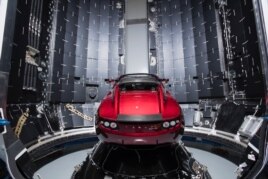05 February, 2018
SpaceX's huge rocket makes its first launch this week. It will leave from the same launch pad that sent men to the moon almost 50 years ago.
The rocket, called the ‘Falcon Heavy', could be launched as early as Tuesday. When it does, it will be the most powerful working rocket in use today.
The Falcon Heavy represents an important moment for the private space company created 16 years ago by Elon Musk. The rocket will be capable of lifting extremely large satellites into orbit and sending spacecraft to the moon, Mars and beyond.
The rocket already has several customers, including the U.S. Air Force.
"I can't wait to see it fly and to see it fly again and again," said the Southwest Research Institute's Alan Stern. He's the lead scientist for NASA's New Horizons spacecraft, which recently flew by Pluto.
Cape Canaveral, the launch location, has not seen this kind of excitement since the last space shuttle flight in 2011. The city expects huge crowds for the afternoon launch from Kennedy Space Center. Visitor center tickets for the best viewing, called "Feel the Heat" and "Closest Package," sold out quickly.
The Heavy is capable of delivering 63,800 kilograms of cargo to low-Earth orbit, nearly 26,700 kilograms to high-Earth orbit, and smaller cargo to Mars and Pluto.
But for its first flight, the rocket will carry Musk's red Tesla Roadster automobile. In addition to SpaceX, he runs the electric car maker Tesla.

This Dec 6, 2017 photo made available by SpaceX shows a Tesla car next to the fairing of a Falcon Heavy rocket in Cape Canaveral, Fla. For the Heavy's inaugural flight, the rocket will carry up Elon Musk's roadster. In addition to SpaceX, Musk runs the el
"Red car for a red planet," Musk tweeted in December, when announcing the surprise cargo. New rockets usually carry blocks of steel or other heavy material instead of true cargo. But Musk felt that was "extremely boring."
The rocket is intended to continually orbit around the sun, wide enough to pass by Mars. The car will be playing the song "Space Oddity," by the musician David Bowie
New business era for space travel
NASA officials said the Falcon Heavy is the latest evidence of the Kennedy Space Center's transformation into a multi-user spaceport. This is a change after many years of launching the space agency's space shuttles.
Besides Space X, NASA is building its own Space Launch System, or SLS, mega-rocket. And Blue Origin, led by Amazon's Jeff Bezos, is also developing a big, reusable orbital-class rocket
The Heavy Falcon costs around $90 million, which is still cheaper than the larger SLS rocket being built by NASA. It is expected to cost over $1 billion a flight.
In 2010, SpaceX became the first private company to launch a spacecraft into orbit and then safely guide it back to Earth, something only large governments had done. Two years later, SpaceX became the first commercial supplier of the International Space Station. Now the company wants to have the first commercial crew launch.
Retired NASA historian and Smithsonian curator Roger Launius warned that SpaceX has "a long history of overpromising," although eventually succeeding.
The Heavy's first flight, for example, has been delayed for years. Musk has admitted the rocket proved harder to build than he thought. He has also been warning for months the rocket might not make it higher than the launch tower.
However, Launius says he is happy for anyone who creates a successful rocket, and will congratulate Musk if he succeeds.
I'm Phil Dierking.
Marcia Dunn reported this story for the Associated Press. Phil Dierking adapted the story for VOA Learning English. Hai Do was the editor.
Would you pay to ride a rocket to space? We want to hear from you. Write to us in the Comments Section or on 51VOA.COM.
_________________________________________________________________
Words in This Story
afternoon - n. the middle part of the day
cargo - n. something that is carried from one place to another by boat, airplane, etc.
customer - n. someone who buys goods or services from a business
cheap - adj. not costing a lot of money
commercial - adj. related to or used in the buying and selling of goods and services
curator - n. a person who is in charge of the things in a museum, zoo, etc.
deliver - v. to take (something) to a person or place
intend - adj. to plan or want to do (something)
location - n. a place or position
package - n. a group of related things that are sold together for a single price
pad - n. a flat area on the ground where helicopters can take off or land
spacecraft - n. a vehicle that is used for travel in outer space
spaceport - n. a base from which spacecraft are launched.
tower - n. a tall, narrow building or structure that may stand apart from or be attached to another building or structure
transformation - n. a complete or major change in someone's or something's appearance, form, etc.
viewing - n. the things that can be seen from a particular place